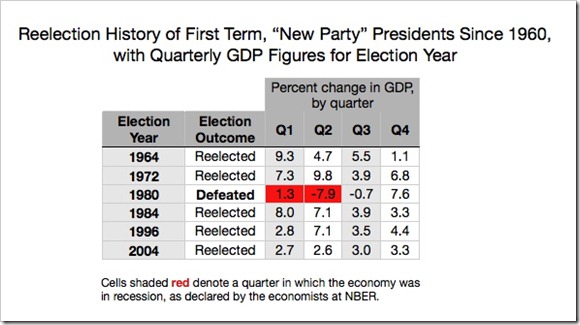- Politics, Institutions, and Public Opinion
Over at HuffPost-Pollster, Helmut Norpoth, a professor of political science at Stony Brook University, has claimed that despite the weak economy, history is on Barack Obama’s side in the president’s campaign for reelection. Norpoth’s argument is that Americans are inclined to give first term presidents who won the White House from the other political party a second term so the administration has a fair chance to deliver on promises made. In Norpoth’s words, “The electorate has loudly registered the demand, ‘It's Time for a Change.’ But change will take time to be implemented. At such moments in history, one may suspect, the public is willing to show some patience with the efforts of the new administration to work its magic.”
Norpoth’s main evidence is the reelection track record of the six, first term, new party presidents since 1960. Only one of these presidents was defeated. On the surface, these are great odds for Obama.
This American-voter-full-of-grace motif has a certain self-deifying appeal to it. But another look at the history of presidential elections shows an American voter more unsparing than forgiving.
The table below presents an augmented version of a table from Norpoth’s article. The table includes the six reelection bids of sitting presidents that Norpoth takes as the comparable cases for the 2012 election. Norpoth’s original table consists of the first two columns below, the election year and the election result. I’ve added columns three through six, the percent change in GDP from the previous quarter for the four quarters in each election year. Cells shaded red denote a quarter in which the economy was in recession, as declared by the economists at NBER.
For five of these six presidential elections, economic growth was robust in the year of the president’s reelection campaign. For one reelection bid, Carter’s in 1980, it was not. I’ll leave intelligent readers to work out for themselves the correlation between economic growth and a president’s reelection prospects. Suffice it to say, it doesn’t seem like American voters were giving Johnson, Nixon, Reagan, Clinton, or G.W. Bush, a big break on economic policy when they reelected these presidents.
What about Ford and H.W. Bush, the other one term presidents since 1960? Norpoth argues that American voters held these presidents to a different – and higher – standard than this president will be measured against. According to Norpoth, American voters didn’t cut Ford or Bush 41 any slack because their Republican predecessors, Nixon and Reagan, had used up all the goodwill. “[W]hen two terms are up,” writes Norpoth, “the public may no longer be inclined to give the administration the benefit of the doubt.” In fact, running as a successor president is such an uphill slog that of the seven elections since 1960 when one party has controlled the presidency for two or more terms, only once has the president’s party won the election, in 1988 when Bush 41 succeeded Ronald Reagan.
Although Norpoth brackets these two elections as immaterial, presidential election prognosticators should not dismiss the relevance of the 1976 and 1992 elections and the warning they serve to sitting presidents running for reelection. In both these election years, economic growth was relatively strong. In 1976, the economy grew at a quarterly rate of 9.4, 3.0, 2.0, and 2.9%. Quarterly growth in 1992 hung in at just north of 4 percent. In neither year was the economy in recession. Yet, among his other political deficits, Ford was unable to escape the shadow cast by the Watergate scandal and his pardon of Nixon in 1976. Bush 41 saw an economic recovery during 1992 but could not capitalize on it as Bill Clinton skillfully cultured voter discontent over both the eight month recession that ended in early 1991 and Bush’s broken tax pledge throughout the general election.
The historical lesson from the reelection bids of first term presidents since 1960 is a less sanguine one for the Obama administration than Norpoth's reading. Americans do not reward the old college try when it comes to our presidents. On the contrary, bad economic news will find the president sent off to start looking at blueprints for his presidential library, and even solid economic growth in an election year has, historically, not been enough to secure a second term.
This election, Democrats should find no comfort in the history of presidential politics. If President Obama wins in 2012, it will be as history making as his first victory.
(photo credit: Daniel Borman)







